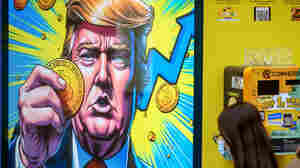

The Indicator from Planet Money
From NPR
A bite-sized show about big ideas. From the people who make Planet Money, The Indicator helps you make sense of what's happening in today's economy. It's a quick hit of insight into money, work, and business. Monday through Friday, in 10 minutes or less.
Most Recent Episodes
Workers on scaffolding lay blocks on one of the larger buildings at a development site where various residential units and commercial sites are under construction. Keith Srakocic/AP hide caption
At least ten new airport lounges are set to open this year in the US, many backed by credit cards Getty Images hide caption
Brain-controlled iPhones, a Japanese asset buy-a-thon, and Trump tax cut debt
Brain-controlled iPhones, a Japanese asset buy-a-thon, and Trump tax cut debt
(Saul Loeb / AFP via Getty) Saul Loeb/AFP via Getty Images hide caption









